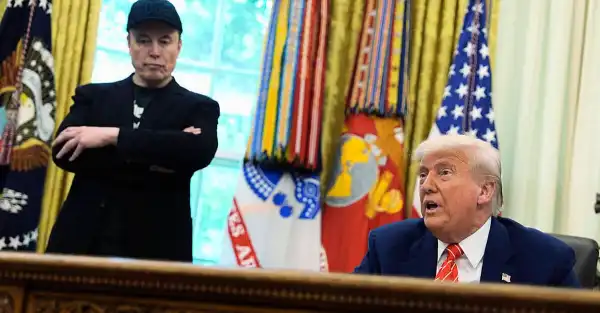
As Donald Trump met privately with White House officials on Wednesday, there was no indication that the US president would soon sever his ties with Elon Musk, the billionaire who helped him win re-election.
Two White House officials familiar with the matter said Trump appeared confused and frustrated at the meeting over Musk’s criticism of his sweeping tax and spending bill. But he held back, the officials said, because he wanted to maintain Musk’s support, both politically and financially, ahead of the midterm elections.
By Thursday afternoon, Trump had changed his tune. He had not spoken to Musk since the attacks began and was furious that a White House aide had described the Tesla CEO’s speech on X, his social media platform, as “completely absurd.”
Musk has criticized Trump's tax bill as fiscally reckless and called it a “disgusting abomination.” He has vowed to oppose any Republican lawmaker who supports it. The bill would satisfy many of Trump's priorities while increasing the U.S. national debt by $2.4 trillion, reaching $36.2 trillion, according to the Congressional Budget Office.
Trump has privately described Musk as unstable. On Thursday, he told his team it was time to act decisively.
Standing next to German Chancellor Friedrich Merz in the Oval Office, Trump told reporters he was “extremely disappointed” in his former adviser. Musk quickly responded on social media, and their spat quickly escalated into something more.
“The easiest way to save billions of dollars in our budget is to end Elon’s government subsidies and contracts,” Trump wrote on his Truth Social social network.
Soon after, Musk said it might be time to form a new political party, and endorsed a post on X from Ian Miles Chong, a prominent Musk supporter and right-wing activist calling for Trump's impeachment.
Unique relationship
The relationship between Trump and Musk has reached an unprecedented level in Washington, with the sitting president giving the billionaire tech CEO access and influence in the White House and his government more broadly.
Last year, Musk contributed about $300 million to support the campaigns of Trump and other Republicans.
For months, Musk has acted as both an insider and a troublemaker — shaping the political conversation behind the scenes, communicating Trump’s agenda to millions online, and criticizing bureaucracy and federal spending through his self-styled Department of Government Efficiency.
Just last week, Trump was holding a farewell for Musk and insisting that “Elon is not really leaving.”
Now he’s not only gone, he’s become a leading critic. Just hours after Trump’s Oval Office address, a third White House official expressed surprise at Musk’s about-face. It “caught the president and the entire West Wing by surprise,” she said.
Musk did not respond to emails seeking comment on the deteriorating relationship. His super spending PAC, America PAC, and spokeswoman Katie Miller did not respond to calls and text messages seeking comment.
In a statement, the White House called the break “an unfortunate episode on the part of Elon, who is unhappy with the One Big Beautiful Bill because it does not contain the policies he would like to see.”
From Allies to Enemies
The breakdown in relations between Musk and Trump sent Tesla shares plunging 14 percent on Thursday and raised uncertainty among Trump supporters in Congress who are working to pass a massive spending package that Democrats and a small group of hardline Republicans oppose.
The rift could change the future of both men. For Trump, losing Musk’s support threatens his growing influence among tech donors, social media audiences and young male voters — key groups that may now be harder to reach. It could also make fundraising more difficult ahead of next year’s midterm elections.
Sourse: breakingnews.ie






